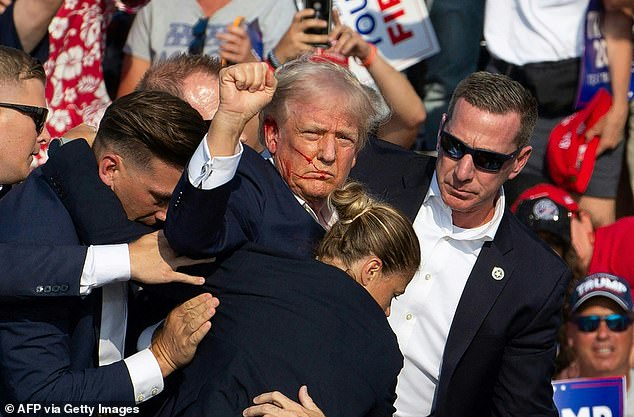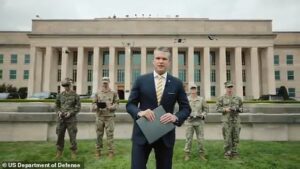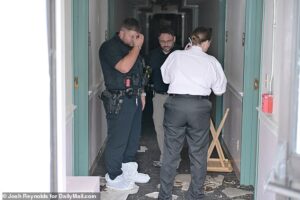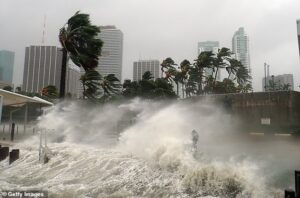
One year after President Donald Trump narrowly missed getting struck by a bullet at a campaign rally, a damning new report faults the Secret Service for a ‘disturbing pattern of communication failures and negligence that culminated in a preventable tragedy.’
Sen. Rand Paul, a Republican from Kentucky, on Sunday released the Senate Homeland Security & Governmental Affairs Committee’s final report from its investigation into the attempt on Trump’s life in Butler, Pennsylvania.
It outlines what Paul called ‘stunning failures by the United States Secret Service that allowed then-former President Donald J. Trump to be shot on July 13, 2024.
‘The truth is, President Trump and the nation was fortunate,’ Paul wrote of the shooting that took the life of firefighter Corey Comperatore and left two others wounded before a government sniper killed the gunman, 20-year-old Thomas Matthew Crooks. ‘The once-again president survived despite being shot in the head.
‘Since that day, there has been another attempt on his life and further threats to do him harm, including most recently, a renewed threat from Iran.’
Paul added that the actions of the Secret Service that day were ‘inexcusable and the consequences imposed for the failures do not reflect the severity of the situation’ despite six agents being temporarily suspended.
Yet the report offers few new details about the assassination attempt and largely echoes a preliminary report on the investigation put forward by then-committee chairman Sen. Gary Peters in September 2024.
Instead, it focuses on 10 different instances leading up to the Butler rally in which the Secret Service denied or left unfulfilled requests for additional resources to support the Trump campaign, including an enhanced counter-drone system, counter-assault personnel and counter snipers.

A damning new Senate report faults the Secret Service for a ‘disturbing pattern of communication failures and negligence’ that contributed to the assassination attempt on then-candidate Donald Trump in Pennsylvania last year

It outlines what Sen. Rand Paul called ‘stunning failures by the United States Secret Service that allowed then-former President Donald J. Trump to be shot’
It found that prior to the deadly shooting, the Secret Service had no formal procedure for submitting resource requests – and therefore there was no standard response concerning approvals or denials from US Secret Service Headquarters.
The report explains that the Senate committee did not find there was an ‘explicit denial’ for enhanced counter-drone systems, but in a transcribed interview to the committee, a Secret Service counter-unmanned aircraft systems agent alleged that such a request was denied via phone by a Secret Service technical security division advance agent.
In total, the 75,000 pages of documents acquired by the committee ‘revealed a pattern of certain categories of requests being either blatantly denied, unfulfilled or required to be supplemented by local law enforcement or other federal agents.’
Yet, the report notes, Secret Service agents at the scene failed to coordinate with the local law enforcement officers.
The Secret Service agents who were covering the event were operating on multiple, separate radio channels, leading to missed communications, according to the report.
But even when agents were alerted about an armed individual on the roof of a nearby building, those on the ground surrounding Trump were not notified about the threat.
Instead, the Senate investigation found, the agent who was in charge of communication with local law enforcement ‘failed to relay critical information e obtained’ from a Pennsylvania State Trooper regarding a suspicious individual with a range finder’ to the agents on the ground ‘who could have removed or prevented President Trump from taking the stage.’
Committee members had also interviewed a Secret Service counter-sniper who said that they saw officers with their guns drawn running toward the building where the shooter was perched, but the person said they did not think to notify anyone to get Trump off the stage.

The report notes there were widespread communication failures between local law enforcement and the agents on the ground protecting Trump
‘The United States Secret Service failed to act on credible intelligence, failed to coordinate with local law enforcement,’ Paul said in a statement.
‘Despite those failures, no one has been fired.’
He then went on to claim there was a ‘complete breakdown of security at every level – fueled by bureaucratic indifference, a lack of clear protocols and a shocking refusal to act on direct threats.
‘We must hold individuals accountable and ensure reforms are fully implemented so this never happens again,’ Paul argued.
But the senator hit out at the Secret Service further by accusing former Director Kimberly Cheatle of lying to Congress and saying that former Acting Director Ronald Rowe’s testimony was also ‘misleading.’
Cheatle had told the committee last year there were ‘no requests that were denied’ for the Butler rally, even though the committee found ‘at least two instances of assets being denied by USSS headquarters’ related to the rally.
Rowe, meanwhile, had testified that ‘all assets requested were approved’ for the Butler rally.
At the same time, though, he said: ‘There are times when assets were unavailable and not able to be filled, and those gaps were staffed with state and local law enforcement tactical assets.’

Paul claimed there was a ‘cultural cover-up’ and said the six agents who were penalized would not have faced any discipline if he had not subpoenaed the agency’s records

He also accused former Secret Service Director Kimberly Cheatle of lying to Congress
In remarks to Face the Nation with Margaret Brennan, Paul claimed there was a ‘cultural cover-up’ and said the six agents who were penalized would not have faced any discipline if he had not subpoenaed the agency’s records.
Cheatle has since fired back, though, saying that while she agrees that ‘mistakes were made and reform is needed… that fateful day was a perfect storm of events.’
‘At the time I provided my congressional testimony, 10 days after the assassination attempt, the information provided to me by personnel from Headquarters and the Trump detail, to include the current agency director, confirmed my statement tat no requests for additional support had been denied to our agents at Butler,’ she told CBS News.
‘Any assertion or implication that I provided misleading testimony is patently false and does a disservice to those men and women on the front lines who have been unfairly disciplined for a team, rather than individual, failure.’
Still, Secret Service Director Sean Curran said his agency ‘will continue to work cooperatively as we move forward in our mission.
‘Following the events of July 13, the Secret Service took a serious look at our operations and implemented substantive reforms to address the failures that occurred that day,’ he said in a statement.
‘The Secret Service appreciates the continued support of President Trump, Congress and our federal and local partners who have been instrumental in providing crucial resources, needed to support the agency’s efforts.’
Among those resources is a new fleet of military-grade drones, Matt Quinn, the Secret Service deputy director, previously told CBS.
He also said the agency has set up new mobile command posts that allow agents to communicate over radio directly with local law enforcement officers.





